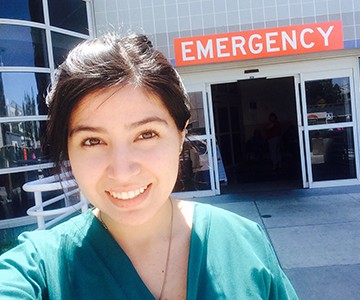 American Association for Respiratory Care (AARC) Calling for More RTs to Earn Bachelor’s Degrees in Respiratory Therapy
American Association for Respiratory Care (AARC) Calling for More RTs to Earn Bachelor’s Degrees in Respiratory Therapy
To ensure the respiratory therapy workforce is prepared to meet the growing challenges and demands it will face in terms of protocol-driven care and disease management, the American Association for Respiratory Care (AARC) has called for 80% of RTs to either hold or be working toward a bachelor’s degree by the year 2020. Recently, the AARC has even suggested that all new RT programs should award, at a minimum, a bachelor’s degree in respiratory care. In a statement, the AARC explained the proposed shift in RT education requirements:
“The continually expanding knowledge base of today’s respiratory care field requires a more highly educated professional than ever before. Factors such as increased emphasis on evidence-based medicine, focus on respiratory disease management, demands for advanced patient assessment, and growing complexities of American healthcare overall, clearly mandate that respiratory therapists achieve formal academic preparation commensurate with an advanced practice role.”
If you have your associate’s degree in respiratory therapy, you may be wondering how a bachelor’s degree compares and if it is really worth it to go back to school for an advanced RT degree.
Minimum Educational Requirement for Respiratory Therapists
An associate’s degree is the minimum educational requirement to practice as a respiratory therapist, but, according to the U.S. Department of Health and Human Services, “employers often prefer that applicants possess a bachelor’s or master’s degree [in respiratory therapy] from a post-graduate program.” In fact, according to statewide surveys by the Health Workforce Initiative (HWI) and the California Hospital Association (CHA), almost a quarter of hospitals in California (225) require respiratory therapists to have a bachelor’s degree. In other words, while you can practice with only an associate’s degree, having a bachelor’s degree may open even more opportunities.
Advanced Respiratory Therapy Curriculum
Considering the shift in education standards and requirements for respiratory therapists, aspiring RTs and practicing therapists shouldn’t think about how associate’s and bachelor’s degrees compare but rather how they complement one another.
According to Jeff Rutherford, Campus President and RT Program Director at SJVC Rancho Cordova, “the bachelor’s program is taking a licensed practitioner to the next level where they learn the skills they need to be a supervisor or manager and be a much more productive practitioner in the managerial, supervisorial and quality assurance aspect for a department.”
SJVC’s online Bachelor of Science in Respiratory Therapy (BSRT) degree completion program builds on the clinical skills RRTs gained at the associate’s level, but also focuses on the knowledge and skills required to move the profession (and your career) forward.
BSRT curriculum covers such topics as:
- Management principles for the healthcare professional
- Establishing best practices in quality improvement in healthcare
- Research and evidence-based practice in healthcare
- Advanced respiratory practice for critical care patients
What does this mean for you?
Graduates of SJVC’s online Bachelor of Science in Respiratory Therapy degree completion program will be able to:
- Articulate various current professional and clinical roles and potential expanded roles related to the respiratory therapy profession including describing professional behavior, monitoring the quality of respiratory care outcomes and listing changes in technology.
- Demonstrate understanding of critical care pathophysiology to interpret pertinent clinical information and make recommendations for appropriate therapeutic intervention.
- Demonstrate the ability to access, interpret, and critically appraise relevant medical and other authoritative literature related to clinical practice, administration, education, and/or research associated with the respiratory therapy profession and potentially affect positive change within your department.
Is a Bachelor’s Degree in Respiratory Therapy Worth It?
According to a recent life satisfaction study of respiratory therapists who had graduated and earned their bachelor’s degree in respiratory care, most participants felt that their degree has helped them to achieve more rapid advancement into critical care areas and supervision. Is a bachelor’s degree in respiratory therapy worth it? Consider the following responses from study participants:
- “Having a [bachelor’s degree] has gotten me a job, opened up doors for more opportunities, and has let me become a vital part in the healthcare setting that I have always wanted.”
- “Although I have only been working a little over a year, my co-workers who have been working several years ask me for my advice daily. I feel my education has given me an edge because I have that extra knowledge.”
- “I believe having a [bachelor’s degree] made me a better therapist and has helped me work my way up in a short amount of time.”
SJVC: Your Bridge to a Bachelor’s in Respiratory Therapy
If you’re ready to invest in your future, San Joaquin Valley College can help. Our online BSRT bridge program allows you to take the next educational step without putting your life on hold. If you are a Registered Respiratory Therapist, find out how easy it is to turn your associate’s degree into a bachelor’s. Request additional information or call 855-667-9557 to learn about the online BSRT program.
 American Association for Respiratory Care (AARC) Calling for More RTs to Earn Bachelor’s Degrees in Respiratory Therapy
American Association for Respiratory Care (AARC) Calling for More RTs to Earn Bachelor’s Degrees in Respiratory Therapy